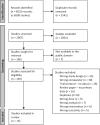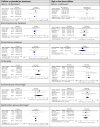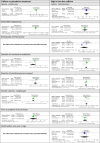Caffeine for apnea and prevention of neurodevelopmental impairment in preterm infants: systematic review and meta-analysis
- PMID: 38553606
- PMCID: PMC11161406
- DOI: 10.1038/s41372-024-01939-x
Caffeine for apnea and prevention of neurodevelopmental impairment in preterm infants: systematic review and meta-analysis
Abstract
This systematic review and meta-analysis evaluated the evidence for dose and effectiveness of caffeine in preterm infants. MEDLINE, EMBASE, CINHAL Plus, CENTRAL, and trial databases were searched to July 2022 for trials randomizing preterm infants to caffeine vs. placebo/no treatment, or low (≤10 mg·kg-1) vs. high dose (>10 mg·kg-1 caffeine citrate equivalent). Two researchers extracted data and assessed risk of bias using RoB; GRADE evaluation was completed by all authors. Meta-analysis of 15 studies (3530 infants) was performed in REVMAN across four epochs: neonatal/infant (birth-1 year), early childhood (1-5 years), middle childhood (6-11 years) and adolescence (12-19 years). Caffeine reduced apnea (RR 0.59; 95%CI 0.46,0.75; very low certainty) and bronchopulmonary dysplasia (0.77; 0.69,0.86; moderate certainty), with higher doses more effective. Caffeine had no effect on neurocognitive impairment in early childhood but possible benefit on motor function in middle childhood (0.72; 0.57,0.91; moderate certainty). The optimal dose remains unknown; further long-term studies, are needed.
© 2024. The Author(s).
Conflict of interest statement
EAO, JMA, and CJDM conducted one of the included studies in this systematic review [Oliphant 2022]. Data extraction and RoB assessment for this study was undertaken by SH, who was not involved in the trial, and an independent colleague (AW). SH has no conflicts of interest to declare.
Figures



References
-
- Henderson-Smart DJ. The effect of gestational age on the incidence and duration of recurrent apnoea in newborn babies. Aust Paediatr J. 1981;17:273–6. - PubMed
Publication types
MeSH terms
Substances
Grants and funding
LinkOut - more resources
Full Text Sources
Medical

